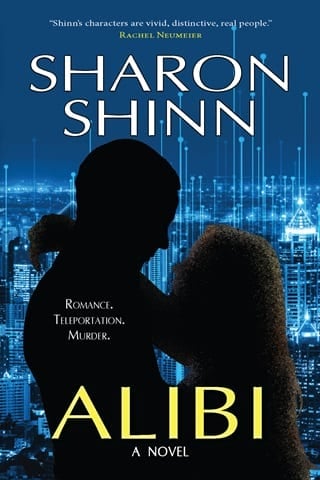CHAPTER SIX
On Friday, I met Dennis.
This memorable event occurred only after an hour’s worth of the chatter, laughter, reluctance, and interest that I was pretty sure would form the pattern of the rest of my sessions with Quentin. He had taken the grammar test, as requested, but had not yet completed his essay on “Dream Monsters,” though he assured me he was working on it. He had, however, printed out by hand the full set of lyrics to “Cranberry Girl.”
“Good,” I said, scanning the lines, with which I was only vaguely familiar. The group, Ocean of Negligence, featured lugubrious synthesizer music and a whiny female vocalist and rated low on my scale of tolerance. “Before we discuss content, let’s look at structure. What’s the first thing you notice about this poem?”
I held it out for Quentin to glance at again. His eyes drifted over the page and then he looked back at me.
“It rhymes?” he said tentatively.
“Exactly,” I said, preparing to launch into my well-rehearsed introduction to poetic form. There are hundreds, thousands, millions of brilliant poems that flow beautifully into conversational free verse, and I know that for many of my students, these would be more instantly accessible than the formal examples I make them learn. But I like to start with the stanzas and the sonnets, the rhythms and the rules. I like to show students the bones and building blocks of poetry before they learn how to take those skeletons apart and reassemble them into something familiar and yet altogether different.
We began with rhyme scheme, which was pretty easy in the case of “Cranberry Girl,” since Ocean of Negligence stuck to an unvarying a-b-a-b configuration. “A lot of poems will have more complex patterns,” I warned. “Maybe every third line will rhyme, or the last line of every stanza will rhyme with all the other last lines. It gets very complicated. The challenge for poets is to say what they want to say, in language as beautiful as they can make it, and still stay within the pattern of the rhyme.”
“It’s kind of jazz when you put it like that.”
“It’s even more jazz when you learn about rhythm and meter,” I said. I began to outline the differences between forms such as iambic pentameter and anapestic trimeter, but I could see his eyes starting to glaze over, so I cut short my usual lecture.
“The point is that the poet can choose how many beats every line will have, and how many syllables will be in every beat,” I said. “It makes more sense when you’re looking at an actual poem. Here’s a simple one by a British poet called A.E. Housman. You listen while I read—I think you’ll like it.”
I knew it by heart, but I looked at my book anyway.
Oh, when I was in love with you
Then I was clean and brave.
And miles around, the wonder grew
How well did I behave.
And now the fancy passes by
And nothing will remain.
And miles around they’ll say that I
Am quite myself again.
Quentin chuckled. “That’s funny.”
“See? I told you you’d like it. Now, let’s deconstruct it.”
Quentin successfully identified the rhyme scheme (a-b-a-b) and the rhythm (iambic), but he got a little tripped up over the fact that the poet had deliberately alternated between tetrameter and trimeter lines. “How can he keep it all straight?” he demanded.
“Well, it takes work. But once you get a beat going in your head, it’s easier than you think.”
“Doesn’t sound very easy,” he muttered.
I ignored this. “Not only is a poet concerned with rhyme and rhythm, of course, he wants to use words to convey an image. Do you know what a metaphor is?”
He nodded. “It’s when you compare one thing to something else.”
“Exactly. So here’s is a poem by Essex Bounty called ‘Your Heart.’ But all the way through, the narrator acts as though he’s speaking about a jewel. He never mentions a human being at all. See what you think.”
Guards at the gate, but I slip past
With diversionary tactics.
Barbed-wire fence, but I clear it fast
With daring acrobatics.
Dogs are calmed with a friendly pat
After my hands are scented.
Threshold stripped of a trip-wire trap,
Alarm box circumvented.
Dark inside—not safe as it seems.
I duck the electric eye.
Carefully step over crisscrossed beams,
Catching me ankle-high.
I finally come to the last sealed door
And grope for my bag of tools,
My heart (long accustomed to being poor)
Pounding like any fool’s.
What if I breach the shadowed vault
To find the jeweled lure
Counterfeit—or webbed with fault—
Or stolen—or secure?
Worse, tell me, what if the legends lie?
No ruby of brooding glamour
Ever was chipped from some secret mine?
Quick, my file and hammer—
His eyes were sparkling when I was done. “That’s strat!” he declared. “He’s like a bank robber.”
“Right. But what’s he stealing?”
Quentin considered. “A heart? I don’t get it.”
“Some people are very closed. Kind of cold. You meet them, and you think maybe they don’t have any emotions at all. But you know they do, because everyone does.”
“Like my dad,” he said, and nodded.
I was stopped short. “Your dad is—he’s not a warm guy?” I absolutely did not know what to say.
He shrugged—or, more truly, hunched his shoulders up as if to ward off something. A memory, a blow. “Not really,” he said. “Anyway. Go on.”
My voice felt a little strained. “So, say a guy meets this girl, and he falls in love with her, but she doesn’t act like she loves him back. But he thinks maybe she does, she’s just not used to showing her emotions. So he tries different ways to sneak past her defenses.”
“The barbed wire and the dog.”
I nodded. “But once he breaks in, he’s not sure what he’ll actually find. What do you think he’s worried about?” And I repeated the last two stanzas line by line, while Quentin correctly interpreted the imagery.
“Or maybe she doesn’t have a heart at all!” he exclaimed triumphantly when I recited the final words. “All that work for nothing!”
“Very good! So he manages to convey all his hopes and fears without once describing the girl he’s in love with, or even telling you exactly how he’s trying to get through to her.”
“Yeah. Pretty jazzy,” he nodded. “Say it again.”
“I’ll print it out for you.”
“I wouldn’t mind poems so much, I guess, if they were all like that.”
“I think I’ll be able to find a couple more that you’ll appreciate. In fact, I’ve got a book of Housman’s poems at home. I’ll bring it in for you. You’ll like a lot of those.”
*
The rest of the lesson didn’t go quite as smoothly. Quentin was restless and unable to concentrate. I went back to rock lyrics, but even those didn’t hold his attention. But I didn’t give in to his requests to play chess, check the internet for baseball trades, call Marika, or learn a GameWhiz program he wanted to show me. I have to admit, I was feeling exhausted by the time our hour drew to a close.
“Now, next week,” I began, when there was a knock on the door. I’d scarcely even glanced in that direction before Quentin had spun around.
“Come in! Come in!” he invited.
In walked a handsome, compact man with short-cropped curly hair, soulful black eyes, and the kind of deeply tanned skin that I associated with a Mediterranean heritage. His thin tight shirt showed off his admirable muscles, and even his three steps into the room were accomplished with a swagger.
“Hey there, Q,” he said. “How’s it going?”
If Quentin had been a puppy, he would have frisked. “Hi, Dennis! You’re early! Does that mean you’ll stay late? I’m feeling really good today, I think I could swim for even longer than an hour.”
“Swimming and weights today,” he said. “Need to build your upper-body strength.” He nodded toward me. “Who’s your girlfriend?”
Quentin laughed. “She’s not my girlfriend, she’s my teacher.”
“Does she have a name?”
I came to my feet and stepped toward him with my hand outstretched. “Hi. I’m Taylor Kendall. I’m Quentin’s English teacher. You must be Dennis. I’ve heard your name mentioned once or twice.”
He brought my hand to his heart in an exaggerated gesture of delight. “Simply thrilled to meet you at last. I’ve heard nothing but Taylor-this and Taylor-that for the past week. I was getting all prepared to resent you, because I’m used to having Quin’s affection all to myself.”
“I think he has enough to spare,” I said dryly.
He laughed. “But you! You look nothing at all like I imagined. You know, dowdy and just a little off. But I can see you’ve opened a fashion magazine or two in your life.”
I was dressed in black jeans and a floaty green silk shirt embroidered in bright colors. It was equally possible that he was being sarcastic or sincere. “Well, you don’t look like the type who would drown people,” I retorted.
He raised his eyebrows and looked from me to Quentin and back again. “Drown people? Who said I would?”
“I never said you had drowned anybody,” Quentin protested.
“I think that’s what Mr. Cortez predicted when he found Quentin wearing one of your shirts.”
Dennis dropped my hand and grabbed Quentin in a headlock before I had even completed my sentence. “My Fat Hippos shirt! Gregory gave that to me. I should throw you out the window.”
Quentin was squealing and squirming, and his wheelchair was skipping wildly from side to side, but he was clearly having a great time. Me, I was noting the mention of “Gregory” and wondering if the name denoted a friend, brother, or lover. Dennis seemed like the type to flirt outrageously and harmlessly with anyone who came his way—man, woman, baby, dog—and that was a characteristic I’d noted more often in shasta men than hetero ones.
“So, what do you think? Out the window or off the top of the roof? I know, I’ll roll you down to the lake and push you in.”
“Dennis! Let me go! I’ll give it back!”
“Maybe I’ll lock you in your father’s hologallery. That seems like a suitable punishment. You’d have nightmares for a week.”
“Hologallery?” I repeated.
Dennis rolled his expressive eyes. He still hadn’t released Quentin, but he’d swung the boy around so that he stood behind him with both arms locked around Quentin’s throat. Quentin’s hands were wrapped around his wrists, and he had his head twisted back as far as he could to look up at Dennis.
“Quentin’s dad has a hologallery of past girlfriends. It’s so utterly gruesome. Ask the little monster to show it to you sometime, but pick a day when his dad’s not home.”
“Hey, let’s go now,” Quentin said. “He’s out of town.”
“I don’t think so,” I said. “I think it’s time for you to go exercise away some of your energy.”
“Nothing like water sports to restore the internal balance between mind and body,” Dennis said in a pious tone.
“Seems a little cold to swim,” I observed.
“Indoor pool, but surely an English teacher would be smart enough to figure that out?” Dennis said.
I couldn’t help laughing. I liked him instantly. Of course, insults and threats are my love languages, so the banter was nothing new to me. But mostly I liked his easy, friendly, relaxed interaction with Quentin. It was rapidly becoming clear to me that anyone who seemed fond of Quentin would earn huge points in my book, and Dennis scored high.
“Hey, Taylor, why don’t you come swim with us?” Quentin invited, pulling away from Dennis and coming closer to me. “I just do laps lots of the time, there’s plenty of room.”
“Thanks, but I’ve got hundreds of things to do at home.”
“Some other time, then,” Dennis said.
“You bet,” I said, not meaning it. When Quentin came close enough, I patted him on the head. Most nineteen-year-olds would jerk away from such a patronizing gesture, but he liked it; he smiled up at me. “See you next week, kid. Tuesday.”
He was a little less reluctant to see me go now that Dennis was on hand, and he merely waved me toward the door.
I stepped outside and found Bram Cortez waiting for me.
“Hello,” I said. “I guess you’re today’s escort detail.”
He smiled slightly, but enough to give his stern features a pleasant cast. “We don’t want you to get lost.”
“You don’t want me wandering through the mansion picking up small objets d’art ,” I said, strolling forward. He fell in step beside me. We headed, not for the elevator, but for the elaborate stairway that spiraled down to the ground floor.
“Oh, that wouldn’t trouble me so much,” he said, completely deadpan. “Our security cameras would register the theft, and we would be able to bring you to the attention of the authorities almost immediately.”
I grinned. “Yeah, I’ve been thinking you were the type of guy to set up monitors in every room. Does somebody just sit there and watch the camera feeds all day?”
He glanced down at me. At five-foot-eight, I’m taller than the average woman, and I was only a few inches shorter than he was, but there was an air of latent menace about him that made him seem bigger. “How thoughtful of you to concern yourself with our security measures,” he said. “We do spot checks of the cameras as they run. We also keep the recordings for a year before discarding them.”
“Good to know,” I said.
We descended half a flight without speaking. “How’s Quentin doing?” he asked after a while. He didn’t seem like the type to be bothered by silence, so I assumed he was genuinely interested.
“I don’t really know yet. I’ve only had him a couple of hours. I think he wants to learn—no, I don’t think he cares about learning,” I corrected myself. “I think he wants to please me. He doesn’t know me very well, obviously, but he likes me to be here. And he thinks if he does what I want, I’ll come back. So he tries to do what I want, but he gets distracted easily, and sometimes I find it hard to make him concentrate. And frankly,” I added, “he seems a lot younger to me than nineteen.”
Cortez nodded. “Yes. I don’t know if that’s because the disease has slowed down some of his emotional development. Or if it’s because the disease has made him so helpless that the rest of us treat him like a child. Or if it’s because he’s had so little interaction with kids his own age that he doesn’t know how to behave.” He shrugged. “Or if he learned a long time ago that a childlike manner would disarm and secure the people he needed to have around him to survive.”
I gave him one quick look. We had just entered the foyer, and this conversation was about to abruptly end. “Interesting assessment,” I said. “It seems to be working on me, at any rate. I find myself very partisan, and I’ve only known him a few days.”
“Wait till you’ve known him a couple of years.”
I started to say, “But I’m only going to tutor him a few months,” but of course, that wasn’t the point. “Well, I’m glad to see that he seems to have won some allies,” I said.
He smiled and pulled back the teleport door for me. “Everyone in the household.”
“How long before I’m a trusted enough member of the household to get my own door code?” I asked.
“Just what I was about to mention,” he said coolly. “If you have one in mind, you can tell me now, and I’ll make sure it’s in place before you come back. Six digits.”
“Great,” I said. “Zero-four-two-one-one-six.”
He nodded, apparently committing it to memory; I would have needed to write it down if I didn’t know it already. “Excellent,” he said. “We’ll expect you at the front door on Tuesday.”
“So long,” I said, letting him shut the door while I keyed in my street code. “See you next week.”
If he replied, I didn’t hear him, because I was already thirty miles away.
*
The weekend was relatively quiet, giving me a chance to catch up on my housecleaning, my laundry, and my viewing of the Vampire Nightly Network. I jumped down to Atlanta Saturday night so Marika and I could see a movie. She hates the three-D surround-sound total body experience of the LucaPlexes, so we went to an old-fashioned theater showing a retrospective of 1980s classics. After singing along with “Footloose,” we stopped for pizza, then swung by her house so I could pick up the Braves shirt she’d bought for Quentin. I promised I’d have him write her a thank-you note as his next essay assignment.
On Sunday, I joined Jason and my mom for brunch. I found them in the living room, putting together a puzzle under my father’s radioactive gaze. Not an activity that appealed to me, so I headed to the kitchen to cook the meal on my mother’s inconvenient and old-fashioned appliances. After we’d eaten, Jason and I headed out into the chilly sunshine, already making tentative plans for the following weekend
“How are your tutoring sessions going with Quentin Phillips?” he asked.
“Good. The household is a little odd, and I find it really strange that I’ve never so much as laid eyes on Duncan Phillips. I mean, if I were a parent, I’d want to meet my son’s tutor and make sure she was doing a decent job. But I’m not sure he cares.”
“That makes him sound like a real prick.”
“Yeah, I have a feeling I wouldn’t like him.” I pulled my jacket tighter and walked a little faster. “But I sure do like his son.”
*
The next week sort of galloped by. I’d assigned short papers for all of my Sefton classes, so I spent most of my evenings reading and correcting them. The range of ability among my students never ceased to amaze me. Devante Ross, who couldn’t get a noun and verb to agree if he took them to marital counseling, wrote with such humor and style that I hated to take points off for grammar (but I did). Evan not only put together poetic, though bleak, sentences about the cycle of life, he also embedded quaint, delicate pencil sketches into his electronic files. They were often my favorite parts of any assignment.
It was during this week of intensive grading that I also read Quentin’s first paper, which he had given me in hard copy on Friday afternoon. I hadn’t read it until I got home that night, since he wouldn’t be quiet long enough for me to even skim the pages, so I gave up trying. Instead, we dissected another rock poem, this one by the suicide blast group called Aspirations of Kudzu, for as long as I could hold his attention. Which was until Dennis arrived and I conceded defeat.
That night I read his essay, and then I turned off the light and stood at the window and cried.
Dream Monsters
by Quentin Calcott Phillips
It takes me a long time to fall asleep. I keep thinking about things. Sometimes I turn on the radio and listen to baseball games. I like the Chicago Cubs and the Atlanta Braves the best, but when they are playing each other, I am always wanting for the Cubs to win.
When I do fall asleep, sometimes I dream that I am playing baseball. I want to be the shortstop because then I can make those great plays that save a run. I can jump so high in the air that none of the opposing players can hit a home run out of the park, the ball always goes into my glove instead. Everyone in the stadium cheers. Sometimes they chant my name over and over, fifty thousand people at once, “Quen-tin! Quen-tin!” It sounds like they are saying “engine” over and over again, but I know it’s my name.
In my dream, I can run faster than any other player, even faster than the ones who are the fastest. My legs look blurry to anyone who is watching. I do not hit the ball so well, but my teammates don’t mind because, once I get on base, I can steal on any pitch. I can steal home on a suicide squeeze. I can steal first base on three strikes. I have never been thrown out stealing.
In my dream, I am running the bases just for fun while the grounds crew is cutting the grass. In my stadium, we have real grass not that artificial turf stuff that is so terrible. I am running very fast, but I’m not paying attention, and the guy who is cutting the grass is not paying attention either. Suddenly I trip over something, and I fall down, and the guy on the lawn mower runs right over my legs. I yell at him to stop, so he stops, but the lawn mower is still on my legs and it is cutting them to pieces. “Get off! Get off!” I yell, but he can’t hear me because the motor is so loud. I see him put his hand to his ear, trying to hear me, but I cannot shout any louder than the motor, and he does not turn the motor off. And so my legs are all chewed up.
I know it is a dream, because in real life I’m not a baseball player, so I’m happy when I wake up. But even when I wake up, my legs are all chewed up and I cannot walk in them or run in them or even catch a fly ball. And I know my dream monster is real.
I know this essay is supposed to be longer but this is all I can think of.
How was I supposed to grade a paper like that?
I called Domenic, and he met me for dinner, just the two of us. We went to a small Italian restaurant where the maitre d’ knew him by name and the waitress flirted with him the whole time we were there. He talked most of the night, in idle and mellifluous tones, and I just listened, letting myself be soothed by his presence and his voice. I never once mentioned that I was sad, but obviously he knew something was wrong; he was taking care of me, in his Domenic way, just existing, just being beautiful and kind. When the meal was over, he walked me to my teleport gate, kissed my cheek before I stepped inside, and stood there and watched me until I disappeared.
The gesture was more comforting than I could say.
 Fullepub
Fullepub 



